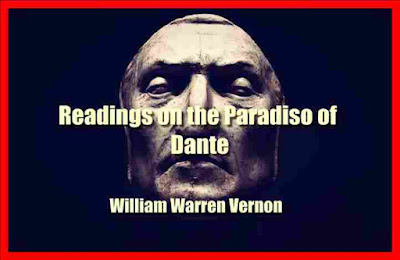Readings on the Paradiso of Dante - PDF by William Warren Vernon
Readings on the Paradiso of Dante
chiefly based on the commentary of Benvenuto da Imola
From my introduction:
In the preface to my two volumes on the Inferno, published in 1894, I expressed the hope that life and ability might be vouchsafed to me to cope with the mystic beauties of the Paradiso and to complete the attempt made in these Readings to make plain to a beginner the difficulties of the three immortal canticle. Life has been spared to me, and with great diffidence, I now present the completion of my work.
It has been thoughtlessly said that there is a falling away of human interest in the Paradiso as if humanity were only interested in the weaknesses and vices of our race, but nowhere else, throughout the Divina Commedia, can be found such pictures of great and good men made perfect, nowhere can the gentlest, as well as the noblest, of human aspirations be seen in so many and so varied forms. Perfect love, in its highest and purest manifestation, is here pictured by a pencil wielded with exquisite grace and power. But the great and good actions of man are not forgotten.
The majestic summary of Roman history, placed in the mouth of Justinian, seems to be spoken to the sound of the marching feet of triumphant legions. Civic life in its simple primitive condition is represented in Cacciaguida's story of old Florentine days — a gem of the description of the unworldly life of the olden time.
The metaphysics and theology may seem tedious to modern unbelievers, but they were stern realities to Dante, and it is from his point of view that I have regarded those lofty subjects, which take up so large a space in the following pages.
These volumes, like their predecessors, are based upon the famous Latin Commentary of Benvenuto da Imola, first delivered as lectures, at Bologna, in 1375, and follow the same order and plan, which has been to take the text verse by verse, to give a faithful translation, to connect the narrative with a running commentary, to explain all difficulties as they arise, and to supply in numerous footnotes a key to philological, literary, and historical doubts. This, apart from the notes, is very much the system of Benvenuto, although he goes somewhat further and construes the text almost word by word. It is the usual method of oral teaching, and is sufficiently expressed by the title of " Readings."
I have again adopted Dr Moore's Oxford text, to which I have added the accentuation of Fraticelli, welcome, I believe, to Italian eyes. I take this opportunity of expressing my great obligations to Dr Moore for the generous and unwearied assistance he has given me during the last four years. It is with deep gratitude that I have been per- mitted to dedicate these volumes to our most distinguished English Dantist Again must I record my heartfelt thanks to my friend Mr H. R. Tedder, the Secretary and Librarian of the Athenaeum, who has revised my work from first to last. It is impossible for me to find words to thank him adequately for his undeviating kindness and patience.
While the plan, much of the connecting narrative, and some of the notes, are due to Benvenuto, I have taken a toll of the labours of many ancient and modern commentators^ whose writings are mentioned in the list of authors consulted. I am unable to thank each one, but I cannot avoid expressing my special obligations to some recent publications. I am glad to be able to congratulate Dr G. A. Scartazzini upon the completion of his learned Enciclopedia Dantesca, as well as upon the last edition (1899) of his Edizione Minore of the text.
The invaluable Dante Dictionary of Mr Paget Toynbee, Mr E. G. Gardner's charmingly written Dante's Ten Heavens, the admirable translations of the Paradiso by Mr. Charles Eliot Norton and Mr Wicksteed have been of great help. To my Wife is due to the ample index, and to her is also due to my warm acknowledgement of much help and encouragement.
The Dowager Duchess of Sermoneta has kindly allowed me to adapt from her late husband's Tavole Dantesche, a coloured plate of the disposition of the universe. I put forth no claim to originality, except, perhaps, as regards the form in which this work is presented to English readers.
The labours of others make all that is valuable herein, and foremost among those must be ranked the Bishop of Ripon, the third distinguished churchman who has honoured me by writing an introduction to one of the divisions of the " Readings." In this beautiful contribution lovers of Dante will read a masterly sketch, eloquent yet condensed, of the spirit in which the Divina Commedia was written. My own share is based upon a life-long devotion to the study of Dante's writings, many years of which were passed in his own country, and associated with those who speak his beloved Tuscan. In the words of the translator of the De proprietatibus Rerum of Bartholomeus Anglicus,
Contents of vol. I.
Dedication v
Preface vii
Introduction by the bishop of Ripon . . Xi
Preliminary chapter: (I)the cosmography of date, (ii) the classification of the spirits in Dante's paradise. (hi) the immeasurable extent of paradise, (iv) date when
The Paradiso was written. (v) the
Beauties of the Paradiso. (vi) time- references, (vii) Dante's own life and experiences, and Tuscan illustrations. Xxiii
Dante's itinerary through paradise . . Xl
List of authors and of editions quoted. Ixxi-lxxxvi text, translation and commentary, canto
I to xvi 1-550
Download Vol 1 - 21 MB
Download Vol 2 - 23.5 MB










